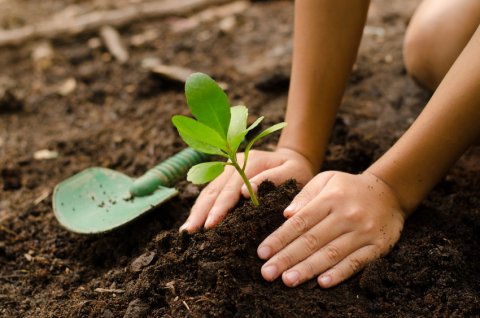Planting the Seeds of Connection

Jewish early childhood programs of all denominations will likely celebrate the modern state of Israel’s 70th year in a similar fashion. There will be hands-on art experiences involving blue and white, flag making and Israeli food. Children may take a pretend trip to Israel. They will “pack their suitcases” with sunscreen and a hat. They will board an “airplane” made of hollow blocks or cardboard boxes and land in Ben Gurion Airport in Israel. Children’s passports will be stamped as they are welcomed to Israel. They will then be guided through a high-speed tour of the Jewish State. The first stop may be a trip to the Kotel, where children get to put a “note” of prayer in the wall. Children may visit the beach and/or the Dead Sea. They may visit Tel Aviv, the Golan and the desert. They may get to the shuk and bring home a souvenir! And this usually marks the end of the journey. While this may mark the end of the pretend trip to Israel in celebration of Yom Ha’atzmaut, I wonder if it also marks the beginning and the end of the annual Israel experience provided to children in Jewish early childhood settings.
If this is the only, or one of the few times we engage in and think about Israel with our students, is this enough? And is this experience everything it could be? Does this approach convey how deeply meaningful Israel is and has been to the Jewish people since ancient times? Does it honor Israel’s place in Jewish identity formation? Does it lay the foundation for understanding Israel as a place that is both real and symbolic?
In order to help sort out these kinds of questions, I recently joined The Jewish Education Project’s Israel in the Early Years Network, a network of educators with cohorts in New York, Baltimore and Chicago. This network is facilitated in part by Dr. Sivan Zakai and Dr. Lauren Applebaum of Project ORLI: Research and Leadership in Israel Education. As part of my involvement in the network, I work with colleagues in New York to look critically at how we approach Israel education in an early childhood setting. Some important overarching questions have emerged: Why are we educating young children about Israel in the first place? What are the goals? Are we accomplishing our goals through the experiences we provide?
How might our approach change if we shift our thinking from presenting Israel as a subject to be taught to seeing it as a relationship that stems from the child and needs to be fostered?
Invariably, when thinking with colleagues, parents and faculty about what we hope to accomplish through an Israel education in early childhood, we come to a similar answer: We hope that young children begin to form a connection with Israel which will be fostered and deepened throughout their Jewish education and carried into adulthood. What exactly this connection looks like and what it means varies a great deal from community to community, school to school, family to family and even from person to person. Still, the goal is to begin to inspire a connection.
This begs the question: Are we, the early childhood educators, in fact, planting seeds that can grow into meaningful connections for our students?
Two summers ago, I had the privilege of participating in The Jewish Education Project’s Qushiyot Israel Education Fellowship. As part of the fellowship, I spent 10 days in Israel in order to explore the values that connect Jews from all over the world to Israel. I gleaned so many lessons from experiencing Israel in this way. I learned that one person’s connection to Israel is often very different from another’s. Most importantly, I learned that in order to achieve a genuine connection to Israel, we need to understand this connection as existing within the context of a person’s relationship with Israel.
How might our approach change if we shift our thinking from presenting Israel as a subject to be taught to seeing it as a relationship that stems from the child and needs to be fostered?
Part of early childhood education is preparation for the future challenges of learning and living. If we want children to develop a strong, meaningful and authentic connection with Israel in the future, we need to begin by presenting a meaningful and authentic picture of Israel from very early on.
Perhaps we would rethink our Yom Ha’atzmaut celebrations and check for authenticity. Perhaps we would meaningfully incorporate Israel into the Jewish experiences, holidays and values that are already part of our curriculum. Perhaps we would start with the children and learn about their ideas and interests and connect those with Israel in a way that feels authentic and natural.
There is no one-size-fits-all answer. Each relationship will be unique to its community of learners, naturally developing its own character. This will create a beautiful tapestry of deep, authentic Israel education that establishes the seeds of a real and meaningful relationship between our young learners and Israel.
Sarah Paikin is the Director of Curriculum for Magen David Yeshivah's Early Childhood Center. She has served as a Jewish educator for all ages from infants to adults and just about every age in between. Sarah has also been part of the leadership team in both congregational schools and early childhood centers. She was a participant in the pilot year of our Qushiyot קושיות: Israel Education Fellowship.